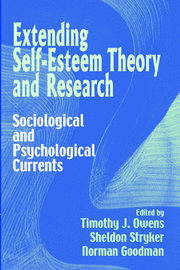Book contents
- Frontmatter
- Contents
- List of Contributors
- SECTION ONE THE FRAME
- SECTION TWO CONCEPTUAL AND METHODOLOGICAL ISSUES
- SECTION THREE SOCIAL AND LIFE COURSE CONTEXTS OF SELF-ESTEEM
- SECTION FOUR SELF-ESTEEM AND SOCIAL INEQUALITIES
- SECTION FIVE SELF-ESTEEM AND SOCIAL PROBLEMS
- 16 The Science and Politics of Self-Esteem: Schools Caught in the Middle
- 17 Self-Esteem and Deviant Behavior: A Critical Review and Theoretical Integration
- 18 Low Self-Esteem People: A Collective Portrait
- Index
16 - The Science and Politics of Self-Esteem: Schools Caught in the Middle
Published online by Cambridge University Press: 24 November 2009
- Frontmatter
- Contents
- List of Contributors
- SECTION ONE THE FRAME
- SECTION TWO CONCEPTUAL AND METHODOLOGICAL ISSUES
- SECTION THREE SOCIAL AND LIFE COURSE CONTEXTS OF SELF-ESTEEM
- SECTION FOUR SELF-ESTEEM AND SOCIAL INEQUALITIES
- SECTION FIVE SELF-ESTEEM AND SOCIAL PROBLEMS
- 16 The Science and Politics of Self-Esteem: Schools Caught in the Middle
- 17 Self-Esteem and Deviant Behavior: A Critical Review and Theoretical Integration
- 18 Low Self-Esteem People: A Collective Portrait
- Index
Summary
PTA Board Member: You teach in the public schools? What subject?
Teacher: Creative mathematics. When a student adds 2 & 2 and gets 7, I ask him why he came to that conclusion. If he tells me he chose the answer because it raises his self-esteem … I give him an A+.
INTRODUCTION
The concept of self-esteem is one of the most influential notions of our time, and certainly one of the most controversial, especially in its implications for schooling and school policy. Much has been written about the wisdom of making self-enhancement a prime goal of schools: stated in starkly contrasting terms, whether students should become good learners or feel good about themselves. Alfie Kohn (1994) comments that “by now this topic has become sufficiently polarized that the vast majority of people who address themselves to it stand in one of two camps: The pro-self-esteemers, mostly educators, who can scarcely believe that anyone would question the importance of trying to improve children's perceptions of their own worth; and the critics, who dismiss such efforts as ineffective and nonsensical distractions from academics” (p. 272).
This debate is far more complex than it appears at first glance. A careful consideration of the issues reveals a nested set of interlocking claims, assumptions, and counterclaims by both sides. First comes the pro-esteem argument that fostering feelings of positive self-regard will automatically increase school achievement. Surely, these advocates argue, students who regard themselves favorably ought to be able to learn and work more effectively. Critics counter by pointing to the meager empirical support for a positive association between self-esteem, on the one hand, and school achievement on the other (see Kohn, 1994).
- Type
- Chapter
- Information
- Extending Self-Esteem Theory and ResearchSociological and Psychological Currents, pp. 351 - 374Publisher: Cambridge University PressPrint publication year: 2001
- 6
- Cited by



